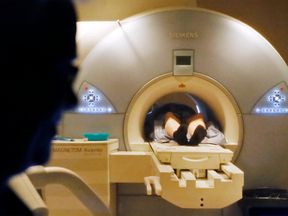Provinces penalized for allowing patients to pay for their own medical scans at private clinics

Article content
By Colin Craig
Advertisements 2
Article content
The Trudeau government recently announced it will be taking action to increase health-care wait times in Canada. That wasn’t exactly how it was worded, but patients should know that longer wait times will likely be the end result.
Article content
The announcement was of $76 million in health-care funding penalties to seven provincial governments. What did these provinces do to earn such a score from their federal overlords? They let patients use their own money to pay for diagnostic scans at private clinics. Ottawa doesn’t like that. The Trudeau government wants everyone to depend on the state for all health-care services — even though government wait times are often atrocious.
By penalizing provincial governments, the federal government is hoping they will stop allowing private diagnostic clinics to sell MRI scans, CT scans and other similar services to the public. But this begs an obvious question: where will these patients go if they can’t use private options?
Article content
Advertisements 3
Article content
Some may go abroad for care. They won’t want to wait six months, a year or even longer for a diagnostic scan. Many others will turn to our already stressed public system for care. In other words, they’ll make waiting lists longer. And what will be the effect of longer waits for tests that diagnose cancer, torn muscles, organ problems, etc. How many patients will suffer permanent damage due to ideological nonsense in Ottawa?
Consider what BC patient Joan Hama told SecondStreet.org in 2022: She almost died after being forced to wait nearly double the recommended delay for a colonoscopy. Hama’s colon eventually ruptured and sepsis set in. She had to be resuscitated multiple times at the hospital as her family waited to say their goodbyes. While politicians play political games with health care, Joan’s story is a type of real-world consequence, and she’s far from alone.
Advertisements 4
Article content
No other developed nation bans patients from using their own money to pay for diagnostics and surgery in their own provinces. Australia, New Zealand, Sweden and other countries with universal health-care systems that outperform us give patients a choice: use the public system or pay for private care. Those who decide to pay for care end up taking pressure off the public system. Is it any wonder these countries also have shorter wait times and higher quality of care?
The Trudeau government’s recent decision is especially disappointing. It seemed last December there might be a ray of hope that the federal government would finally end its prohibition on private options outside our public system. Speaking to the media about health-care funding, Prime Minister Trudeau said: “It wouldn’t be the right thing to do to just throw more money at the problem and sit back and watch the problem not get fixed because we didn’t use this moment to say, ‘No, no, no, it’s time to improve the system.’”
Advertisements 5
Article content
A few months after the prime minister’s comments, however, he announced more funding for health care with little in the way of reform. In other words, same old, same old. In 1991, governments spent an average of $1,683 per person on health care. Last year that was up to $5,629. The increase was nearly double Canada’s inflation rate. And yet the problems got worse. More money hasn’t been solved by our system’s woes.
-

Opinion: The private sector is key to pandemic preparedness
-

Terence Corcoran: Canada’s Marxist health plan
What the federal government should have done is announce flexibility for provincial governments. Let them allow private options outside the public system. An Ipsos poll in February found 60 per cent of Canadians agreed with this idea.
It’s time for health reform. A good first step? Keep the public system but remove bans on private options.
Colin Craig is president of SecondStreet.org.


Comments
Postmedia is committed to maintaining a lively but civil forum for discussion and encourages all readers to share their views on our articles. Comments may take up to an hour for moderation before appearing on the site. We ask you to keep your comments relevant and respectful. We have enabled email notifications—you will now receive an email if you receive a reply to your comment, there is an update to a comment thread you follow or if a user you follow comments. Visit our Community Guidelines for more information and details on how to adjust your email settings.
Join the Conversation